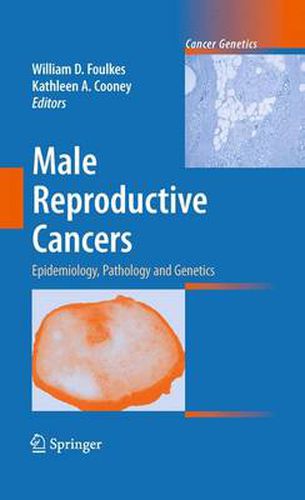Readings Newsletter
Become a Readings Member to make your shopping experience even easier.
Sign in or sign up for free!
You’re not far away from qualifying for FREE standard shipping within Australia
You’ve qualified for FREE standard shipping within Australia
The cart is loading…






This title is printed to order. This book may have been self-published. If so, we cannot guarantee the quality of the content. In the main most books will have gone through the editing process however some may not. We therefore suggest that you be aware of this before ordering this book. If in doubt check either the author or publisher’s details as we are unable to accept any returns unless they are faulty. Please contact us if you have any questions.
Knowledge about cancer genetics is rapidly expanding, and has implications for all aspects of cancer research and treatment, including molecular causation, diagnosis, prevention, screening, and treatment.
Additionally, while cancer genetics has traditionally focused on mutational events that have their primary effect within the cancer cell, recently the focus has widened, with evidence of the importance of epigenetic events and of cellular interactions in cancer development. The role of common genetic variation in determining the range of individual susceptibility within the population is increasingly recognized, and is now being widely addressed using information from the Human Genome Project. These new research directions will highlight determinants of cancer that lie outside the cancer cell, suggest new targets for intervention, and inform the design of strategies for prevention in groups at increased risk.
Today, the NCI is putting more and more money into research into the genetics of cancer. The very first of the NCI’s stated research priorities is a project called The Cancer Genome Atlas. The Cancer Genome Atlas (TCGA) is a comprehensive and coordinated effort to accelerate the understanding of the molecular basis of cancer through the application of genome analysis technologies, including large-scale genome sequencing. The NCI and the NHGRI (National Human Genome Research Institute, where the series editor is employed) have each committed $50 million over three years to the TCGA Pilot Project.
This book proposes cover the latest findings in the genetics of male reproductive cancers; specifically cancers of the prostate and testes. The volume will cover the epidemiology of these cancers; model systems, pathology, molecular genetics, and inherited susceptibility.
$9.00 standard shipping within Australia
FREE standard shipping within Australia for orders over $100.00
Express & International shipping calculated at checkout
This title is printed to order. This book may have been self-published. If so, we cannot guarantee the quality of the content. In the main most books will have gone through the editing process however some may not. We therefore suggest that you be aware of this before ordering this book. If in doubt check either the author or publisher’s details as we are unable to accept any returns unless they are faulty. Please contact us if you have any questions.
Knowledge about cancer genetics is rapidly expanding, and has implications for all aspects of cancer research and treatment, including molecular causation, diagnosis, prevention, screening, and treatment.
Additionally, while cancer genetics has traditionally focused on mutational events that have their primary effect within the cancer cell, recently the focus has widened, with evidence of the importance of epigenetic events and of cellular interactions in cancer development. The role of common genetic variation in determining the range of individual susceptibility within the population is increasingly recognized, and is now being widely addressed using information from the Human Genome Project. These new research directions will highlight determinants of cancer that lie outside the cancer cell, suggest new targets for intervention, and inform the design of strategies for prevention in groups at increased risk.
Today, the NCI is putting more and more money into research into the genetics of cancer. The very first of the NCI’s stated research priorities is a project called The Cancer Genome Atlas. The Cancer Genome Atlas (TCGA) is a comprehensive and coordinated effort to accelerate the understanding of the molecular basis of cancer through the application of genome analysis technologies, including large-scale genome sequencing. The NCI and the NHGRI (National Human Genome Research Institute, where the series editor is employed) have each committed $50 million over three years to the TCGA Pilot Project.
This book proposes cover the latest findings in the genetics of male reproductive cancers; specifically cancers of the prostate and testes. The volume will cover the epidemiology of these cancers; model systems, pathology, molecular genetics, and inherited susceptibility.